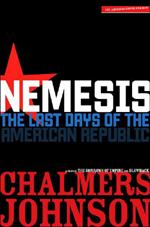Chalmers Johnson, author of the indispensable Blowback trilogy, discusses the economic costs of empire, his belief that Bush has decided against war with Iran, the failure of the American people and the structure of the Republic to prevent executive branch tyranny, Admiral Fallon’s dangerous insubordination for a good cause and the future of blowback against the United States, the secrecy of the national security state and Israel’s recent bombing of Syria.
economic costs of empire, his belief that Bush has decided against war with Iran, the failure of the American people and the structure of the Republic to prevent executive branch tyranny, Admiral Fallon’s dangerous insubordination for a good cause and the future of blowback against the United States, the secrecy of the national security state and Israel’s recent bombing of Syria.
MP3 here. (33:10)
Chalmers Johnson is president of the Japan Policy Research Institute, a non-profit research and public affairs organization devoted to public education concerning Japan and international relations in the Pacific. He taught for thirty years, 1962-1992, at the Berkeley and San Diego campuses of the University of California and held endowed chairs in Asian politics at both of them. At Berkeley he served as chairman of the Center for Chinese Studies and as chairman of the Department of Political Science. His B.A., M.A., and Ph.D. degrees in economics and political science are all from the University of California, Berkeley. He first visited Japan in 1953 as a U.S. Navy officer and has lived and worked there with his wife, the anthropologist Sheila K. Johnson, every year between 1961 and 1998.
Johnson has been honored with fellowships from the Ford Foundation, the Social Science Research Council, and the Guggenheim Foundation; and in 1976 he was elected a fellow of the American Academy of Arts and Sciences. He has written numerous articles and reviews and some sixteen books, including Peasant Nationalism and Communist Power on the Chinese revolution, An Instance of Treason on Japan’s most famous spy, Revolutionary Change on the theory of violent protest movements, and MITI and the Japanese Miracle on Japanese economic development. This last-named book laid the foundation for the “revisionist†school of writers on Japan, and because of it the Japanese press dubbed him the “Godfather of revisionism.â€
He was chairman of the academic advisory committee for the PBS television series “The Pacific Century,†and he played a prominent role in the PBS “Frontline†documentary “Losing the War with Japan.†Both won Emmy awards. His most recent books are Blowback: The Costs and Consequences of American Empire (New York: Metropolitan Books, 2000) and The Sorrows of Empire: Militarism, Secrecy, and the End of the Republic, which was published by Metropolitan in January 2004. Blowback won the 2001 American Book Award of the Before Columbus Foundation.




Chalmers leaves other historians in the dust…he sees it..The U.S. became an empire a long time ago and has become a hyper-empire since the end of the Cold War..
Bush talks about democracy in the Middle East but the word is only a weapon that he can use to beat the regimes the West doesn’t control…Democracy? Poor Lebanon is a democracy but Bush gave the OK for the pointless, sadistic and brutal carpet bombing of Lebanon’s infrastructure and civilian areas last summer because two of their soldiers were captured..( And they still haven’t gotten them back )…Bush doesn’t care about promoting democracy in our puppet regimes-only those who won’t kiss Zionist ass…Honestly, I don’t care about democracy either..Benevolent dictators or Monarchs is what the region really needs as far as I can see…( Saddam was an ENEMY of Al-Quaeda and was protecting the Christians in Iraq )…
Chalmers is a non-ideologue who sees the world the way it is.
Bill, you're absolutely correct about democracy. It's a flimsy excuse for all sorts of criminality. I have to laugh at how folks will hem and haw about "democracy" as though it were a god and could heal the sick etc…. but jeepers creepers watch out if you get in its holy rollin way because you just might end up dead!
I have read all three of Johnson’s blowback books. They illuminated the state of our militancy and its seemingly irreversible character in vivid detail. In Nemesis, his comparison between the U.S. of today and the decline of the Roman Empire is seemingly appropriate and more than worrisome. In some ways that comparison disadvantages us because the Roman leaders had to have military experience to justify their authority. In Bush and Cheney we have military dodgers and war profiteers. But, for a country that simply doesn’t know its own history and its own atrocities done in the name of democracy and freedom, when all the while it was corporate interests that were being protected, the American public looks more like a compliant slave to corporate commodity hawking rather than a literate, educated people. Is it really too late for the country to wake up and learn about itself? The military budget of today is a noose around our neck that prevents us from solving our real problems, yet promises to view them only as threats to our future.
I wanted to warn about something in the book “Blowback.” Johnson refers to Islamic militants as the “mujahideen.” This is consistent as to what they may call themselves and with what many talking heads refer to these militants as, but we should not give them this title. Mujahideen has a very positive connotation in the Islamic world. Militants should not be held in such a positive light. This only exacerbates the problem.